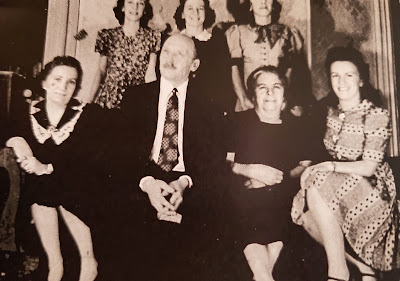Week 48
The theme this week is "Thief." We don't always like to admit it, but sometimes our research uncovers people who have run afoul of the law. Have you found someone who didn't exactly have a clean record?
“Coming at you like a thief in the night.”
This week’s blog is about the criminal element that exists in the family tree, huh? I think I can help with that. No, there isn’t any Mafia or Godfather stories here. At least I don’t think there is. And even if there was, why would I post it online for everyone to see? Never make that stuff public. See nothing and hear even less!
That being said, let me regale you all with the tale of someone in the tree who might have had a sketchy past. His name was Francesco Papatolo and he was the son of Vincenzo Papatolo and Concetta Coppola. Concetta, if you recall was the sister of my 2x great-grandmother, Caterina. She moved to Haverhill with her family in the early 1900s along with her two brothers.
Francesco was born in San Pietro a Maida on March 4th 1908 and traveled with the family to make a life for themselves in America. When I first found out about him, I thought he lived a relatively normal life. He married a woman named Mary Louise Proulx on December 21st, 1932 and had two children with her. I had no idea when he passed away at that point. He wasn’t even in the 1940 census with his family. I thought that was odd.
When I discovered him, I did what any genealogist would do. I asked my great-aunt about him. The following conversation happened:
Me: Aunt Nickie, do you remember anything about Frank?
Nickie: Frank? Oh, he was Aunt Zia’s firstborn child.
Me: Cool. I haven’t found much about him. All records kind of stop in the 1930s.
Nickie: Oh. There’s a reason for that.
Me: Okay.
Nickie: Yeah. He was shipped back to San Pietro.
Me: What?! Why?!
Nickie: I don’t remember.
That was understandable. My great-aunt was in her 90s. I didn’t expect her to remember everything. Though, her memory is pretty good. I still had a bit of a puzzle. What did Francesco do that got him sent back to Italy? What did he do?
I wasn’t about to find out what he did by sitting around. I wanted to know what he did. The way my great-aunt put it made it seem like he stole something. Would that be enough to warrant deportation? What if his immigration paperwork failed somehow? Perhaps I was just trying to romanticize it as I was looking for the truth.
Eventually, I came into contact with a DNA match who descended from one of the daughters. She said that her grandfather ultimately passed away in 1983 in San Pietro. He apparently divorced her grandmother and married someone else in town. She was unsure about what he did. He just was not in the country by the time of the 1940 census and his wife was listed as married. That just leads to more questions.
No one in the family seemed to know. So, the case is still open. What did Francesco do?! I have a theory.
People aren’t shipped back to their mother country for no reason. From what I can piece together from testimony from my great-aunt and my cousin, a crime was definitely committed in the town of Haverhill some time before 1939. The political scientist in me thinks that he may have violated some laws concerning his immigration papers or something.
We could spend ages speculating on what happened. After all, once you have eliminated the impossible, whatever remains no matter how improbable must be the truth.
We could spend ages speculating on what happened. After all, once you have eliminated the impossible, whatever remains no matter how improbable must be the truth.
The only way I will ever find out for sure is if I were to check out newspaper archives and court records in Haverhill. That is the only thing I can think of. For now, this will have to be an unsolved mystery. This post may have to be amended to in the future. Anyone want to hazard a guess as to what he might have done?
See ya next time!











